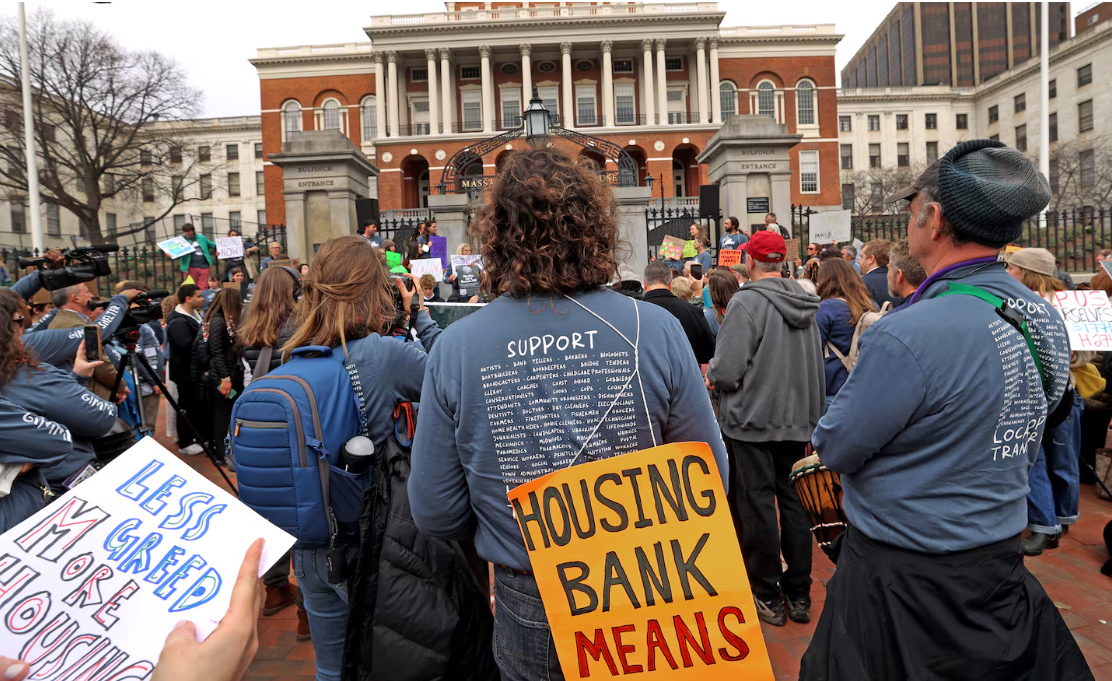马萨诸塞州参议院公布 52 亿美元住房债券法案,不包括房地产转让费

【中美创新时报2024 年 6 月 25 日编译讯】(记者温友平编译)马萨诸塞州参议院实际上已经否决了一项允许城市和城镇对高端房产销售征收费用的计划,这粉碎了住房倡导者的希望,但却取悦了曾强烈反对这一想法的强大房地产行业。《波士顿环球报》记者Samantha J. Gross 和 Andrew Brinker 对此作了下述报道。
州参议院周一(24日)公布的 52 亿美元住房债券法案中省略了转让费的本地选项,该措施还包括数十亿美元的经济适用房、税收抵免以及重新制定全州分区规则的计划。这项收费提案得到了州长莫拉·希利(Maura Healey)和波士顿市长吴弭(Michelle Wu)的支持,但在本月初众议院版本的法案中,该提案也被忽略了。
这项全面的法案涉及住房政策的许多其他领域,从解决该州农村地区的住房短缺问题到支持公平住房办公室。但担任住房委员会主席的参议员莉迪亚·爱德华兹(Lydia Edwards )表示,该法案的目标是作为“路线纠正”,而不是一剂良药。她说,该州陷入的棘手住房危机太大,无法一蹴而就。
官员们在 2023 年底表示,到 2030 年,该州至少需要 20 万套新住房来容纳新的增长并保持健康的空置率,但周一发布的法案只会解决其中的 4 万套。
“该法案不能解决所有问题,”这位东波士顿民主党人说。 “我们无法消除数十年来的忽视、种族歧视、对气候变化科学的无知……以及糟糕的分区。”

虽然参议院版本的法案与众议院的法案相似,没有纳入有争议的费用,但在许多方面与众议院的法案有所不同。
参议院的法案提议借款 52 亿美元,这一成本远低于众议院的 62 亿美元——这一差额不包括众议院提议借款的 10 亿美元,用于帮助扩大马萨诸塞州水资源管理局的水服务范围,使其不再局限于现有的 60 个城市和城镇。缺乏清洁水供应是许多社区开发更多住房的障碍,扩大马萨诸塞州水资源管理局是众议院议长罗恩·马里亚诺的首要任务。
参议院的议案将成立一个委员会,就老年人可负担住房政策、项目和投资提出建议,并提议大幅削减暂停混合收入项目基金,从众议院提议的 2.5 亿美元削减至 5,000 万美元。
此外,参议院的法案还删除了众议院支持的一项条款,该条款规定,如果房东想出售房屋,租房者有机会购买自己的房屋。
可负担住房倡导者庆祝了周一发布的法案中的多项胜利,包括一项新的多户住宅分区激励基金和一项包容性分区提案。
该立法将允许城市和城镇以简单多数票而不是三分之二票数通过包容性分区规则,该规则要求新的市场价格开发项目包含一定比例的可负担住房。房地产集团认为,这样的规则会减缓开发速度并提高市场租金,因为可负担性要求使住房建造成本更高。
尽管该法案授权州政府在指定项目上花钱,但这并不一定意味着这些钱会被花掉。
尽管支持者普遍对州长、众议院和参议院在住房立法方面的进展感到满意,但他们对一些明显的排除条款表示失望。
例如,很少有租户保护政策被纳入参议院法案的任何版本,众议院特别删除了一项措施,该措施在某些情况下允许封存租户过去的驱逐记录。(参议院又把它加了回来。)
而且,很少有资源专门用于购房,这与几年前该州向专门针对首次购房者的计划投入数百万疫情资金的情况不同。
“这很有挑战性,因为这项债券法案需要包含很多内容,才能开始缓解这场毁灭性的危机,”马萨诸塞州经济适用房联盟执行董事西蒙·克劳福德(Symone Crawford )说。“但排除购房计划的资金是一个巨大的疏忽。”
参议院取消转让费的决定对包括经济适用房倡导者、一些商界领袖、房地产经纪人和来自数十个城镇的地方官员在内的广泛联盟来说是一个特别沉重的打击。
这项费用在很大程度上被房地产行业的积极运动所推翻。大波士顿房地产委员会发出了邮件、大量短信和网站,称该提案是一项“新税”,“将拖累你的钱包和我们的经济”。
大波士顿宗教间组织今年一直大力支持转让费,该组织在一份充满激情的声明中对最终结果表示失望。
“这一疏忽意味着我们的城市和城镇被剥夺了真正的奋斗机会,”GBIO 说。“为什么 [倡导者] 不得不拼命争取这项措施才能得到考虑,而像大波士顿房地产委员会这样的有钱实体却能够在立法会议的最后阶段引发下意识的反应?”
然而,商业和房地产团体对参议院的决定表示庆祝。
大波士顿房地产委员会首席执行官格雷格·瓦西尔表示,他“很高兴”该法案除其他事项外,还拒绝了转让费等“有缺陷的政策”。
马萨诸塞州财政联盟发言人保罗·克雷尼表示:“令人费解的是,这项住房税上调措施竟然一开始就被考虑了。”
希利版本的住房债券法案将允许市政当局自愿对超过 100 万美元的房产销售征收 0.5% 至 2% 的费用,或对超过 100 万美元的县中位房屋销售价格的房产销售征收 0.5% 至 2% 的费用。
吴弭的提议于 2022 年获得市议会批准,该提议将允许波士顿对高价房地产交易征收高达 2% 的费用,这笔费用将由卖方承担。该费用只对 200 万美元或以上的交易征收,前 200 万美元免征。
吴弭在 2023 年作证时表示,如果该市关于转让费的自治请愿在 2021 年获得通过,该税将为该市的经济适用房基金筹集 1 亿美元。2020 年,时任市长马丁·J·沃尔什 (Martin J. Walsh) 支持一项措施,该措施将对波士顿价值超过 200 万美元的销售额征收 2% 的税。该提案在灯塔山夭折。
吴弭在周一的一次无关活动中告诉记者:“在这方面,第三次对这座城市来说并不顺利。”
波士顿并不是唯一一个推动转让费来资助经济适用房工作的城市。楠塔基特岛至少十年来一直在推动该提案的版本,萨默维尔、康科德和布鲁克莱恩等市也提出了转让费。
希利在州议会大厦举行的一次无关活动中告诉记者,“立法机构仍处于审议过程中”,她的政府将继续制定促进住房和降低成本的战略。
与众议院的版本一样,参议院法案允许在马萨诸塞州所有划定为单户住宅开发的街区建造附属住宅单元(也称为 ADU 或老年公寓),这符合希利推动的一项措施。
参议院对其版本进行投票后,领导人将与众议院领导人讨论分歧。
“我认为双方和州长都对这次谈话感到紧迫,”爱德华兹说。
题图:2023 年 5 月,州议会的倡导者呼吁立法者采取措施创造更多经济适用房。DAVID L. RYAN/GLOBE STAFF
附原英文报道:
Mass. Senate unveils $5.2 billion housing bond bill, excluding real estate transfer fee
By Samantha J. Gross and Andrew Brinker Globe Staff,Updated June 24, 2024
Advocates at the State House in May 2023 called on lawmakers to take steps to create more affordable housing.DAVID L. RYAN/GLOBE STAFF
The Massachusetts Senate has effectively quashed a plan to allow cities and towns to impose a fee on the sales of high-end properties, dashing the hopes of housing advocates but pleasing the powerful real estate industry that had lobbied hard against the idea.
The local option for a transfer fee was omitted from the Senate’s $5.2 billion housing bond bill unveiled Monday, a measure that also includes billions for affordable housing, tax credits, and plans to remake statewide zoning rules. The fee proposal, championed by both Governor Maura Healey and Mayor Michelle Wu of Boston, was also left out in the House’s version of the bill earlier this month.
The sweeping bill touches many other areas of housing policy, from addressing a shortage of housing in rural parts of the state to supporting a fair housing office. But Senator Lydia Edwards, who chairs the housing committee, said the goal of the bill is to act as a “course correction” instead of a salve. The intractable housing crisis in which the state is enmeshed is too big to address in one swing, she said.
The state needs at least 200,000 new housing units by 2030 to accommodate new growth and maintain a healthy vacancy rate, officials said at the end of 2023, but the bill released Monday would only address 40,000 of those.
“The bill can’t fix it all,” the East Boston Democrat said. “We cannot undo decades of neglect, of racial discrimination, of just not knowing the science about climate change . . . and horrible zoning as well.”
While it mirrors the House’s bill in leaving out the controversial fee, the Senate’s version of the bill diverges from the House version in a number of ways.
The Senate’s bill proposes $5.2 billion in borrowing, a cost that comes out well below the House’s $6.2 billion version — a difference that excludes the $1 billion the House proposed in borrowing to help expand the Massachusetts Water Resources Authority’s water service area beyond the existing 60 cities and towns. A lack of clean-water supply is an obstacle for many communities to develop more housing, and expanding the MWRA is a priority of House Speaker Ron Mariano.
The Senate measure would create a commission to recommend policies, programs, and investments centered on affordable housing for seniors, and proposes to sharply reduce a fund for paused mixed-income projects from the House’s proposed $250 million to $50 million.
Additionally, the Senate’s bill removes a clause backed by the House that would afford renters the opportunity to buy their unit if their landlord wants to sell.
Affordable-housing advocates celebrated a number of victories in the bill that was released Monday, including a new multifamily zoning incentive fund and an inclusionary zoning proposal.
The legislation would allow cities and towns to pass inclusionary zoning rules, which require new market-rate developments to include a certain ratio of affordable units, by a simple majority instead of a two-thirds vote. Real estate groups argue that such rules slow the pace of development and raise market rents because affordability requirements make housing more expensive to build.
Even though the bill authorizes the state to spend money on the specified items, it doesn’t necessarily mean the money will get spent.
Although advocates were generally pleased with the progression of the housing legislation from the governor, the House, and the Senate, they expressed frustration over some notable exclusions.
Very few tenant-protection policies have made it into any version of the Senate bill, for example, and the House notably stripped away a measure that would have allowed for the sealing of renters’ past eviction records in some cases. (The Senate added it back in.)
And there are very few resources dedicated to homeownership, a pivot from a few years ago when the state was pouring millions in pandemic funds into programs dedicated to first-time homebuyers.
“It is challenging because so much needs to be in this bond bill to start chipping away at this devastating crisis,” said Symone Crawford, executive director of the Massachusetts Affordable Housing Alliance. “But excluding funding for homeownership programs is a huge oversight.”
The Senate’s exclusion of the transfer fee was a particularly tough blow for a broad coalition that included affordable-housing advocates, some business leaders, realtors, and local officials from dozens of towns.
The fee was largely felled by an aggressive campaign from the real estate industry. The Greater Boston Real Estate Board sent out mailers, mass texts, and websites that framed the proposal as a “new tax” that “will be a drag on your wallet and our economy.”
The Greater Boston Interfaith Organization, which has been out in force in support of the transfer fee this year, voiced its disappointment over the final product in an impassioned statement.
“This omission means that our cities and towns have been denied a real fighting chance,” GBIO said. “Why is it that [advocates] have had to fight tooth and nail for this measure to even be considered, while monied entities like the Greater Boston Real Estate Board were able to trigger a knee-jerk reaction in the final stages of the legislative session?”
Business and real estate groups, however, celebrated the Senate’s decision.
Greg Vasil, CEO of the Greater Boston Real Estate Board, said he was “thrilled” that the bill, among other things, rejected “flawed policies” such as the transfer fee.
Paul Craney, spokesperson for the Massachusetts Fiscal Alliance, said, “It’s mystifying that this tax hike on housing was even being considered in the first place.”
Healey’s version of the housing bond bill would allow municipalities to voluntarily impose a fee of 0.5 percent to 2 percent on property sales over $1 million, or those above the county’s median home sales price in places where that exceeds $1 million.
Wu’s proposal, which the City Council approved in 2022, would have allowed Boston to impose a fee of up to 2 percent on high-dollar real estate transactions, a cost that would be borne by the seller. The fee would be levied only on transactions of $2 million or more, with the first $2 million exempt from the fee.
Wu testified in 2023 that if the city’s home-rule petition for a transfer fee had passed in 2021, the tax would have collected $100 million for the city’s affordable-housing fund. In 2020, then-Mayor Martin J. Walsh supported a measure that would have assessed a 2 percent tax on sales worth more than $2 million in Boston. The proposal died on Beacon Hill.
“Third time was not the charm for the city on this front,” Wu told reporters at an unrelated event Monday.
Boston is not the only city that has pushed for a transfer fee to fund affordable-housing efforts. Nantucket has been pushing for a version of the proposal for at least a decade, and Somerville, Concord, and Brookline have also proposed transfer fees, among other municipalities.
Healey told reporters at an unrelated event at the State House that “the Legislature is still very much in the midst of its process,” and that her administration will keep engaging on strategies to boost housing and lower costs.
Like the House’s version, the Senate bill allows for accessory dwelling units — also known as ADUs or granny flats — to be built by-right in all neighborhoods zoned for single-family development across Massachusetts, embracing a measure Healey has pushed.
After the Senate votes on its version, leaders will hash out their differences with their House counterparts.
“I think both sides and the governor have a sense of urgency around this conversation,” said Edwards.

